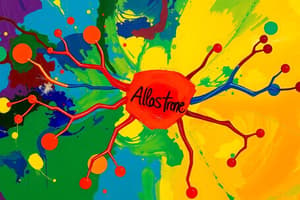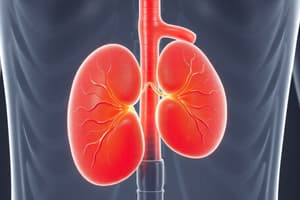Podcast
Questions and Answers
Which event describes the primary physiological response of epinephrine during exercise?
Which event describes the primary physiological response of epinephrine during exercise?
- Increased blood flow to the muscles. (correct)
- Increased digestive enzyme secretion.
- Decreased heart rate and cardiac output.
- Increased parasympathetic nervous activity.
How does epinephrine primarily affect glucose levels in the body during stress?
How does epinephrine primarily affect glucose levels in the body during stress?
- By inhibiting lipolysis in adipose tissue.
- By promoting glycogenolysis and gluconeogenesis. (correct)
- By reducing hepatic glycogenolysis.
- By increasing insulin production.
What is one primary symptom of pheochromocytoma?
What is one primary symptom of pheochromocytoma?
- Spontaneous episodes of low blood pressure.
- Increased activity of the digestive system.
- Consistent decreases in heart rate.
- Severe, unregulated production of catecholamines. (correct)
What physiological change occurs in the GI tract during a sympathoadrenal response?
What physiological change occurs in the GI tract during a sympathoadrenal response?
Which of the following best describes the role of norepinephrine and epinephrine on the heart?
Which of the following best describes the role of norepinephrine and epinephrine on the heart?
What is the primary action of aldosterone in the renal tubule?
What is the primary action of aldosterone in the renal tubule?
Which of the following statements regarding mineralocorticoid receptors is true?
Which of the following statements regarding mineralocorticoid receptors is true?
What is a potential consequence of excess aldosterone secretion?
What is a potential consequence of excess aldosterone secretion?
How does aldosterone primarily alter gene expression?
How does aldosterone primarily alter gene expression?
What would be a result of insufficient aldosterone-mediated Na+ reabsorption?
What would be a result of insufficient aldosterone-mediated Na+ reabsorption?
Which mechanism allows aldosterone to increase Na+ reabsorption in the collecting duct?
Which mechanism allows aldosterone to increase Na+ reabsorption in the collecting duct?
What happens to extracellular volume when there is a 2% change in sodium excretion?
What happens to extracellular volume when there is a 2% change in sodium excretion?
What is a common clinical implication of aldosterone's effect on electrolyte balance?
What is a common clinical implication of aldosterone's effect on electrolyte balance?
Which factor stimulates aldosterone synthesis by increasing intracellular calcium levels in glomerulosa cells?
Which factor stimulates aldosterone synthesis by increasing intracellular calcium levels in glomerulosa cells?
What role does Angiotensin II play in aldosterone synthesis?
What role does Angiotensin II play in aldosterone synthesis?
Which enzyme is essential for the conversion of pregnenolone to aldosterone?
Which enzyme is essential for the conversion of pregnenolone to aldosterone?
What is the effect of ACTH on aldosterone synthesis in the adrenal cortex?
What is the effect of ACTH on aldosterone synthesis in the adrenal cortex?
What is a potential clinical implication of excess aldosterone production?
What is a potential clinical implication of excess aldosterone production?
What is the primary hormonal product of the adrenal medulla?
What is the primary hormonal product of the adrenal medulla?
How does cortisol influence the development of chromaffin cells in the adrenal medulla?
How does cortisol influence the development of chromaffin cells in the adrenal medulla?
What triggers the release of aldosterone from the zona glomerulosa?
What triggers the release of aldosterone from the zona glomerulosa?
Which of the following is NOT a stimulant for aldosterone synthesis?
Which of the following is NOT a stimulant for aldosterone synthesis?
What is the result of increased mineralocorticoid receptor activity due to aldosterone?
What is the result of increased mineralocorticoid receptor activity due to aldosterone?
What cells are exclusively responsible for the synthesis of aldosterone?
What cells are exclusively responsible for the synthesis of aldosterone?
Which factor significantly stimulates aldosterone secretion?
Which factor significantly stimulates aldosterone secretion?
Which of the following hormones has a regulating effect on aldosterone secretion?
Which of the following hormones has a regulating effect on aldosterone secretion?
What is one of the primary actions of aldosterone in the kidney?
What is one of the primary actions of aldosterone in the kidney?
Aldosterone acts mainly through which type of receptors?
Aldosterone acts mainly through which type of receptors?
What is the consequence of prolonged exposure to high levels of aldosterone?
What is the consequence of prolonged exposure to high levels of aldosterone?
Aldosterone primarily governs which bodily parameter?
Aldosterone primarily governs which bodily parameter?
Which hormone is known to work alongside aldosterone in the regulation of osmolality?
Which hormone is known to work alongside aldosterone in the regulation of osmolality?
What effect does aldosterone have on potassium levels in the body?
What effect does aldosterone have on potassium levels in the body?
What role does angiotensin II play in aldosterone synthesis?
What role does angiotensin II play in aldosterone synthesis?
Which hormone is primarily secreted by the majority of the adrenal medulla cells?
Which hormone is primarily secreted by the majority of the adrenal medulla cells?
What percentage of circulating norepinephrine originates directly from the adrenal medulla?
What percentage of circulating norepinephrine originates directly from the adrenal medulla?
What is the function of chromogranins in the chromaffin granule complex?
What is the function of chromogranins in the chromaffin granule complex?
Which system primarily regulates the secretion of epinephrine and norepinephrine from the adrenal medulla?
Which system primarily regulates the secretion of epinephrine and norepinephrine from the adrenal medulla?
What role do adrenal medullary catecholamines play in response to stress?
What role do adrenal medullary catecholamines play in response to stress?
Which brain regions are primarily involved in initiating sympathetic responses?
Which brain regions are primarily involved in initiating sympathetic responses?
What is a characteristic of catecholamines in the adrenal medulla?
What is a characteristic of catecholamines in the adrenal medulla?
During stress, what effect does cortisol have on epinephrine response?
During stress, what effect does cortisol have on epinephrine response?
In what form are adrenomedullary catecholamines transported after being synthesized?
In what form are adrenomedullary catecholamines transported after being synthesized?
What function does the vesicular monoamine transporter (VMAT) serve in the adrenal medulla?
What function does the vesicular monoamine transporter (VMAT) serve in the adrenal medulla?
Flashcards
Aldosterone's Action
Aldosterone's Action
Aldosterone affects distal tubule and collecting duct sodium reabsorption, impacting electrolyte balance.
Aldosterone Mechanism
Aldosterone Mechanism
It alters gene transcription (DNA instruction) after binding to receptors, changing protein activity.
Proximal Tubule Reabsorption
Proximal Tubule Reabsorption
Most sodium reabsorption happens in the proximal tubule, not influenced by aldosterone.
Sodium Reabsorption (Distal)
Sodium Reabsorption (Distal)
Signup and view all the flashcards
Hyperkalemia
Hyperkalemia
Signup and view all the flashcards
Hypokalemia
Hypokalemia
Signup and view all the flashcards
Mineralocorticoid Receptor (MR)
Mineralocorticoid Receptor (MR)
Signup and view all the flashcards
Na+/K+ Pump
Na+/K+ Pump
Signup and view all the flashcards
Aldosterone's Function
Aldosterone's Function
Signup and view all the flashcards
Renin-Angiotensin System
Renin-Angiotensin System
Signup and view all the flashcards
Aldosterone Synthesis
Aldosterone Synthesis
Signup and view all the flashcards
Aldosterone Secretion Stimuli
Aldosterone Secretion Stimuli
Signup and view all the flashcards
Aldosterone Target
Aldosterone Target
Signup and view all the flashcards
Aldosterone Mechanism (Simplified)
Aldosterone Mechanism (Simplified)
Signup and view all the flashcards
Extracellular Fluid Osmolarity
Extracellular Fluid Osmolarity
Signup and view all the flashcards
Sodium Reabsorption (Distal)
Sodium Reabsorption (Distal)
Signup and view all the flashcards
Adrenal Hormones Class
Adrenal Hormones Class
Signup and view all the flashcards
Steroid Synthesis
Steroid Synthesis
Signup and view all the flashcards
ROMK channel
ROMK channel
Signup and view all the flashcards
ENaC channel
ENaC channel
Signup and view all the flashcards
SGK
SGK
Signup and view all the flashcards
Aldosterone synthesis regulation (RAS)
Aldosterone synthesis regulation (RAS)
Signup and view all the flashcards
High extracellular K+
High extracellular K+
Signup and view all the flashcards
Adrenal Medulla
Adrenal Medulla
Signup and view all the flashcards
Adrenal Cortex Development
Adrenal Cortex Development
Signup and view all the flashcards
Cortisol and Chromaffin Cells
Cortisol and Chromaffin Cells
Signup and view all the flashcards
Chromaffin cell differentiation
Chromaffin cell differentiation
Signup and view all the flashcards
Ang II and aldosterone
Ang II and aldosterone
Signup and view all the flashcards
Sympathoadrenal Response to Exercise
Sympathoadrenal Response to Exercise
Signup and view all the flashcards
Catecholamines
Catecholamines
Signup and view all the flashcards
Pheochromocytoma
Pheochromocytoma
Signup and view all the flashcards
Symptoms of Pheochromocytoma
Symptoms of Pheochromocytoma
Signup and view all the flashcards
Diagnosis of Pheochromocytoma
Diagnosis of Pheochromocytoma
Signup and view all the flashcards
Adrenal Medulla Function
Adrenal Medulla Function
Signup and view all the flashcards
Catecholamine Storage
Catecholamine Storage
Signup and view all the flashcards
Epinephrine vs. Norepinephrine
Epinephrine vs. Norepinephrine
Signup and view all the flashcards
Catecholamine Regulation
Catecholamine Regulation
Signup and view all the flashcards
Stress Response (Hormones)
Stress Response (Hormones)
Signup and view all the flashcards
Sympathetic Nervous System
Sympathetic Nervous System
Signup and view all the flashcards
Adrenal Medulla (Essential?)
Adrenal Medulla (Essential?)
Signup and view all the flashcards
VMATs in catecholamines
VMATs in catecholamines
Signup and view all the flashcards
Autonomic Centers
Autonomic Centers
Signup and view all the flashcards
Epinephrine Function
Epinephrine Function
Signup and view all the flashcards
Study Notes
The Adrenal Gland and Adrenal Hormones
- Aldosterone, epinephrine, and norepinephrine are hormones.
- Aldosterone is a mineralocorticoid.
- Aldosterone is synthesized in the zona glomerulosa of the adrenal cortex.
- Aldosterone regulates extracellular volume by its effect on sodium reabsorption by the kidney and impacts water balance.
- The renin-angiotensin system is a major regulator of aldosterone secretion.
- The five adrenoceptor subtypes respond differently to adrenaline and noradrenaline.
- Adrenaline and noradrenaline are involved in the 'fight or flight' response
- Cortisol and aldosterone are produced from cholesterol.
- Aldosterone is not stored, secretion rate is governed by synthesis rate in the glomerulosa cells.
- ACTH, extracellular potassium and sodium and Angiotensin II stimulate aldosterone production.
- Enzymes like SCC enzyme and aldosterone synthase, are key in aldosterone production process.
- 37% of circulating aldosterone is free in plasma.
- Aldosterone's primary action is stimulating the kidney to reabsorb sodium and water and to increase potassium secretion.
- Aldosterone impacts distal tubule and collecting duct Na+ reabsorption
- Imbalances can result in significant electrolyte abnormalities.
- Aldosterone affects target renal tubular cells by influencing sodium-transport proteins (e.g. Na+/K+ pump).
Synthesis of Aldosterone
- Aldosterone synthesis occurs exclusively in glomerulosa cells of the adrenal cortex.
- The rate of aldosterone secretion is controlled by synthesis rate.
- ACTH, extracellular potassium and sodium levels, and angiotensin II are stimulatory factors.
- Enzymes SCC enzyme and aldosterone synthase are important in rate-limiting synthesis steps
- ~37% of circulating aldosterone is free in the plasma
- The remaining portion binds to CBG (21%) and albumin (42%).
Mechanism of Action of Aldosterone
- Aldosterone acts by modulating gene transcription after binding to Mineralocorticoid receptors (MR).
- It regulates only a small portion of renal sodium reabsorption that happens in the distal tubule and collecting duct.
- Loss of aldosterone's effect can lead to significant electrolyte abnormalities.
- Excess aldosterone leads to hypokalemia and hypertension.
Mechanism of Action of Aldosterone (detailed)
- Aldosterone increases transcription of the Na-K pump and enhances expression of sodium channels and Na/K/Cl transporter.
- These actions increase sodium reabsorption and potassium secretion.
- ROMK = renal outer medullary potassium channel
- ENaC = epithelial sodium channel
- Key proteins involved in sodium transport are enhanced by aldosterone.
Zona Glomerulosa Aldosterone: Regulation
- Nat and water levels are regulated through the renin-angiotensin system (RAS).
- Angiotensin II binds to a receptor, triggering a cascade that increases intracellular calcium concentration.
- Calcium increases, stimulating the production of P450scc (desmolase, CYP11A1), and delivery of cholesterol/aldosterone synthase.
- High extracellular potassium depolarizes glomerulosa cells.
- Voltage gated calcium channels open and then stimulate production of P450scc and cholesterol/aldosterone synthase.
- ACTH also stimulates aldosterone synthesis
- Binding to MC2R stimulates calcium influx.
Regulation of Aldosterone Synthesis (detailed)
- The hypothalamus, pituitary gland (ACTH), and renin-angiotensin system control aldosterone synthesis.
- Increased blood volume or pressure, low blood sodium, or high blood potassium stimulate aldosterone synthesis.
- Decreased blood pressure , Na+, or increased K+ trigger different pathways
- Other pathways such as direct stimulation, or inhibitory effects also play a part.
Feedback Regulation of Aldosterone Synthesis
- Blood levels of potassium ([K+]) and sodium ([Na+]) are monitored to regulate aldosterone.
- High [K+] stimulates aldosterone release, whereas high [Na+] inhibits it.
- Changes in blood volume and blood pressure affect aldosterone synthesis.
The Adrenal Medulla: Catecholamines
- The adrenal medulla synthesizes and secretes epinephrine and norepinephrine in response to stress, exercise, and hypoglycemia.
- Chromaffin cells are responsible for catecholamine production and secretion.
- Norepinephrine and epinephrine are synthesized through a series of enzymes (tyrosine hydroxylase, DOPA decarboxylase, dopamine-beta-hydroxylase, and phenylethanolamine-N-methyl transferase.
- Catecholamines are stored in chromaffin granules.
- Epinephrine accounts for the majority, 70-80%
Development of the Adrenal Gland (AG)
- Adrenal cortex develops from mesoderm.
- Chromaffin cells (neural crest origin) migrate into cortical cells, forming the adrenal medulla.
- Cortisol from the adrenal cortex inhibits the differentiation of chromaffin cells into sympathetic neurons
- Cortisol increases expression of PNMT, leading to conversion of norepinephrine to epinephrine.
The Adrenal medulla
- The adrenal medulla acts as a sympathetic ganglion without postganglionic neurons.
- Catecholamines are secreted directly into the bloodstream.
- The primary signaling is Acetylcholine (ACh),
- ACh increases tyrosine hydroxylase and dopamine β-hydroxylase activity, leading to catecholamine production.
Degradation of Catecholamines
- Catecholamines are degraded quickly (~10 seconds).
- Monoamine oxidase (MAO) and catechol-O-methyltransferase (COMT) are the key enzymes.
Mechanism of Action of Catecholamines
- Catecholamines (epinephrine and norepinephrine) bind to adrenergic G protein-coupled receptors (GPCRs).
- Different receptors (e.g., a1, a2, β1, β2, β3) mediate different responses.
- Epinephrine has higher potency on certain receptors (e.g. β2), while norepinephrine has higher potency on others.
Physiologic Actions of Catecholamines
- Catecholamines are involved in the fight-or-flight response.
- Increased blood flow to muscles, increased glucose availability, and decreased energy demand in visceral smooth muscle are some of the key physiological outcomes of norepinephrine and epinephrine.
Pheochromocytoma
- A tumor of the adrenal medulla or other chromaffin tissue.
- Excessive catecholamine production leading to symptoms like hypertension, headaches, sweating, and anxiety.
- Diagnosis involves laboratory detection of urinary catecholamines and treatment may involve surgery.
Studying That Suits You
Use AI to generate personalized quizzes and flashcards to suit your learning preferences.




